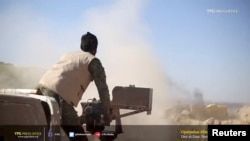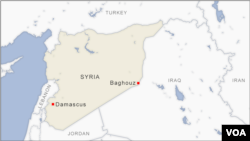Hundreds of people left the last area held by the Islamic State group in Syria on Tuesday where they gathered in a massive reception area to be searched and screened by U.S.-backed fighters.
Some of those who gathered outside the village of Baghouz said they had been waiting since the previous night when hundreds left the IS-held pocket. The latest wave of evacuations brings the final defeat of the extremists' so-called "caliphate" at the hands of the Kurdish-led Syrian Democratic Forces closer.
Officers from the U.S.-led coalition were seen screening the men who had left the IS-held area to determine if they were militants or civilians.
The exodus came three days after the U.S.-backed forces resumed their push on IS militants holed up in Baghouz on the banks of the Euphrates River, close to the Iraqi border.
In past weeks, thousands of civilians left the speck of territory in organized evacuations following an earlier halt in fighting. The Kurdish-led forces said their fighters were surprised by the large number of civilians, including IS family members, cooped up in the tiny area squeezed smaller and smaller by intermittent offensives.
The U.S.-backed forces slowed their push on Baghouz last week to allow civilians to leave the tiny enclave.
Asked about the situation inside Baghouz, a Russian woman who came out with her three children responded in broken Arabic: "Fear." She said her husband had died earlier.
Another woman in her mid-20s who identified herself as Reem from the central Syrian province of Hama, said she was waiting for her husband to come out of an IS-controlled jail. He has been there for months after killing an IS member in retaliation "for his baby daughter being killed in an airstrike," she said.
"I haven't seen him since and don't know where he is," Reem said, adding that she asked repeatedly for his whereabouts before she eventually decided to leave.
The evacuees said the bombing was intense over the past days. One woman said she saw a man hit by a missile as she was escaping from one tent to another.
Another woman said many are waiting to leave and that the scene is chaotic at the safe passage area.
Earlier on Tuesday, SDF spokesman Mustafa Bali, tweeted that about 3,000 people came out of Baghouz on Monday. They left through a humanitarian corridor established by the Kurdish-led forces for those who want to leave or surrender.
Since Feb. 20, more than 10,000 people have left the IS pocket, often in dramatic scenes of black-robed women with children in the back of trucks passing through the corridor and heading into the desert. They were then whisked off to a camp for displaced people to the north, while suspected IS fighters were moved to detention facilities.
Retaking the last IS-held enclave in Baghouz would be a milestone in the devastating four-year campaign to end the group's self-proclaimed caliphate that once covered a vast territory straddling both Syria and Iraq.
Bali said a large number among those who left Monday were IS fighters who "surrendered to our forces."
It is unclear how many IS militants and civilians remain inside, but the number is now likely in the hundreds.
In Saudi Arabia, Russian Foreign Minister Sergey Lavrov met with the head of the main Syrian opposition negotiating body.
Russia has been one of the main backers of Syrian President Bashar Assad in this country's eight-year civil war. It has also hosted peace talks for Syria, rivaling the U.N.-sponsored negotiations. Russia, along with other countries, has been pushing for the formation of a committee to draft a new Syrian constitution.
Lavrov, who met with Naser al-Hariri, chief of the High Negotiations Committee, during his trip to Saudi Arabia said in comments carried by Russian news agencies on Tuesday that Moscow appreciates al-Hariri's intensions to seek compromise in the talks and expressed hope that the constitutional committee will be formed soon.
Al-Hariri in his turn promised to Lavrov that his group will continue to coordinate with Russia on the negotiations.
The 150-member committee is intended to represent the government, the opposition and civil society and is seen by the U.N. as key to holding free elections and ending the civil war in Syria.






